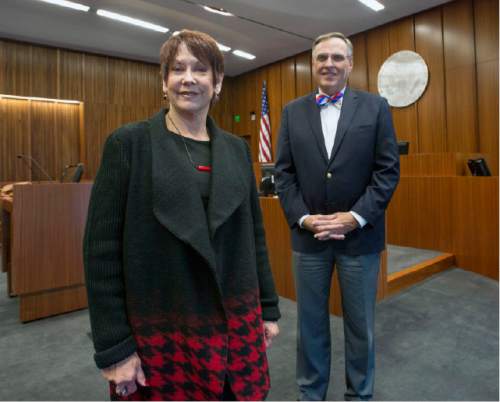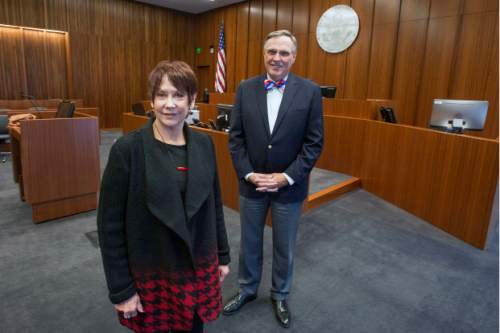This is an archived article that was published on sltrib.com in 2014, and information in the article may be outdated. It is provided only for personal research purposes and may not be reprinted.
Drug addict: Wrong side of the tracks. Few opportunities. Ne'er-do-well. Party animal.
Sarah: Good family. Private schools. Straight A student. Well-behaved.
Until: Serious illnesses. Prescription pain pills.
"I never wanted to go and get high. I just wanted to feel better," Sarah said recently. "Those visits to the doctors led gradually to even heavier dependence on things I should never have been taking in the first place."
Then came heroin, and, two years ago:
"I was living in a hotel with my husband because we were on the run from the FBI for robbing several banks in the Salt Lake area. All this to fund our increasingly exorbitant and increasing heroin addiction," Sarah said. "I was slamming about 3½ grams of heroin a day when I was in my addiction and that's about an $800 habit a day."
The inevitable arrest. Agonizing cold-turkey stay in jail.
Now two years later, Sarah, who didn't want her last name used, told her story inside the federal courthouse in Salt Lake City to a gathering of federal judges, prosecutors and others, including her probation officer.
She was there this week because of her success in participating in one of three so-called re-entry courts that are part of the U.S. District Court for Utah in Salt Lake City.
Sarah went through Drug Court, one of three special courts which also focus on those suffering serious mental health problems and veterans who have mental health or addiction issues, or often both.
U.S. Magistrate Judge Brooke Wells, herself a former prosecutor, said she and others — prosecutors, U.S. Marshals, Bureau of Prisons officials, public defenders — got the idea about nine years ago for special courts from the state court system.
State Drug Courts try to resolve cases short of conviction and sentencing. But Wells told a recent seminar that Department of Justice policies meant any similar federal court had to operate after a conviction. Federal judges in Utah approved a pilot program that has now been running for nearly a decade, Wells said.
The goal of the special courts is to reintroduce moderate- to high-risk offenders safely back into society by promoting sobriety and law-abiding behavior to reduce their chances of falling back into the justice system.
"All of which result in significant savings to taxpayers," Wells said.
The Drug Court convenes on Thursdays with Wells presiding, but in an atmosphere she describes as collaborative and not adversarial, as are most U.S. court proceedings.
Probation officers, mental health professionals, prosecutors, defense attorneys and others operate on what she called a "positive or affirmation model," but one that includes "evidence-based practices."
"Among those practices," Wells explained, "are the proven principles that when people perform well, when they do things well, when they assume responsibility, when they remain sober, when they attend treatment and do all those other things as required, they are entitled to, just as we hope we are, to some praise and some congratulations."
People who have mental health issues and commit crimes, Wells said, are among the toughest cases federal judge have to deal with, sometimes made worse by the system itself when inmates are sent to various out-of-state facilities and then returned to Utah.
"In many, many cases, they were coming back, and this was often while in the Bureau of Prisons custody, with little or no medication, no treatment plan."
Those conditions resulted in some who slid back into serious circumstances that made them unfit to participate in court proceedings.
Behavioral Health Court (formerly Mental Health Court) also brings together a group of people, including those who treat mental illness, to help stabilize mentally ill offenders by providing them contacts and resources to maintain that stability and live independently.
A woman identified only as the mother of a man named David said her son needed help after finishing a prison term.
"When my son was released from prison," she said, "he came home with mental health issues he didn't have when he went in."
A probation officer suggested he try the Behavioral Health Court and he's been doing "very well," the mother said.
"He's been getting weekly therapy," she said. "He's been getting his medication."
U.S. Magistrate Judge Paul Warner, a former U.S. attorney for Utah, said he got the idea for a special court from a magazine article he read after taking his father-in-law to an appointment at the Veterans Administration Hospital.
Veterans courts are relatively new, created in response to the large number of service members — some 2.5 million — who have returned from the wars in Iraq and Afghanistan, said Warner, himself a Navy and Army National Guard veteran.
"What we have learned along the way is that most of them come back reasonably well," he said. "But about 25 percent, and maybe as high as 30 percent, come back with some form of mental or emotional problems."
Those include brain injuries, post-traumatic stress disorder and other issues that lead some of them to illegal drugs and alcoholism, and into legal trouble.
"What we have learned as a practical matter," Warner said, "is we can either deal with these people now or we can deal with them later."
He cited the programs available at the V.A. as "an embarrassment of riches," where Veterans Court can send offenders who need short-term and long-term housing, mental health treatment and medical care.
Warner said more than 150 veterans have passed through the court.
Wells said available resources means Drug Court can handle only a maximum of 25 participants at one time, while Behavioral Health Court has a maximum of 10 offenders at a time.
Sarah said she didn't want to participate in Drug Court at first, but did it for her family. She then found support from her probation officer and from Wells, whom Sarah acknowledged she was terrified of during early hearings.
"It's just what I needed," she said. "I needed love. I needed support and I needed consistency."





